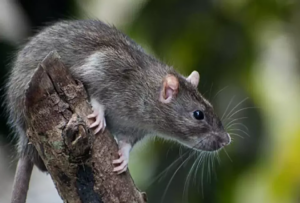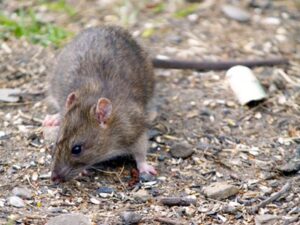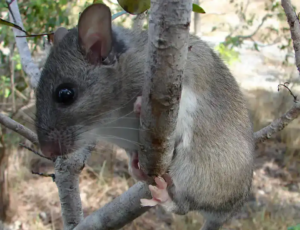Rats can cause significant problems in Jacksonville, FL. Rats cause structural and aesthetic damage to the interior and exterior of homes. They contaminate food and carry diseases, risking your and your family’s health. It is crucial to address a rat problem as soon as you notice rat activity. The Norway rat is the most common rat pest in the U.S., but in Florida, the roof rat is the dominant rat species. The tropical climate, miles of coastline, and agricultural facilities like cow-calf operations, hog farms, and citrus groves provide ideal conditions for the palm rat to thrive.
Most COmmon Rats in Jacksonville, FL

Palm Rat
These rats are the most found rats in Jacksonville. Palm Rats are also known as Roof Rats. These rats can grow up to 8 inches long, have long tails and are typically black or brown. They are usually vegetarians, but if they’re hungry enough, aren’t opposed to eating anything. It’s important to get rid of roof rats as soon as you suspect them in your home. Female Palm Rats can produce over 20 offspring in a year and can live up to three years!

Norway Rat
These rats are typically found outside. They can grow up to 16 inches in length and are typically brown or grey in color Norway rats have shorter tails and scales on their body. You can identify a Norway Rat infestation by the droppings left behind in your home. Norway rat droppings tend to be of a rounder shape and larger compared to the Palm and Wood Rat.

Wood Rat
Out of the three, Wood Rats are the least common of the North Florida rat species. Along with damaging your home, leaving dropping and eating food, Wood Rats are also infamous for stealing small items. Wood rats are sneaky critters that grow to about 7 inches long. They typically are black or greyish-brown in color and have more furry compared to the other Jacksonville rat species.
Why Are Roof Rats a Problem in Jacksonville, FL
Roof rats are a significant problem for Jacksonville, FL residents due to a combination of the city’s subtropical climate, lush vegetation, and geographic location near the coast. These rodents, also known as black rats, fruit rats, or ship rats, thrive in warm, humid environments—conditions that Jacksonville offers nearly year-round. The area’s mild winters allow rats to remain active through all seasons, increasing the likelihood of infestation without a natural break in breeding cycles.
Jacksonville’s dense tree canopy, especially in neighborhoods like Mandarin, Ortega, and Avondale, creates an ideal environment for roof rats. These rodents are excellent climbers and are drawn to palm trees, fruit trees, ivy-covered fences, and overgrown landscaping, which provide food, shelter, and easy access to rooftops. Once on a roof, they can quickly exploit vulnerabilities such as vents, eaves, soffits, or cracked rooflines, allowing them to enter attics where they nest undisturbed.
The city’s proximity to waterways—including the St. Johns River and Intracoastal Waterway—also contributes to elevated rat activity. Moisture-rich environments near the coast support larger rat populations and create more nesting sites in crawlspaces and under structures. Combined with Jacksonville’s growing urban sprawl, older housing stock, and abundant green spaces, these factors make it easy for roof rats to find shelter close to human activity.
Signs of a Roof Rat Infestation
Roof rats will hide from you if they’re inside your home, but they will leave evidence of the infestation.
- Strange noises at night in the attic or inside walls
- Droppings and grease marks along bottom of wall
- Damaged insulation
- Gnawed wires or plumbing in attic
Why DIY Rat Control Doesn’t Work Long-Term
Ultrasonic repellents and other rat deterrents might keep rats away, but they will not get rid of an established rat infestation in the attic or the walls.
Does it feel like your rat traps aren’t working?
Most DIY rat control solutions consist of placing a few rat traps around the kitchen or in the attic. Most homeowners do not use enough traps. Rats are naturally cautious and avoid anything new in their environment, so rat traps are ineffective without proper baiting and strategic placement.
Professional exclusion services are the most effective rat control. Rats can exploit tiny weaknesses and cracks to get inside, and most people can’t recognize all the potential ways a rat can get inside.
At Trutech, we combine humane removal with proven long-term strategies to stop infestations at the source.
Professional Rat Control in Jacksonville, FL
Don’t waste your hard-earned money on DIY trapping methods that won’t solve your problem. Call in the team of experts at Trutech for rat removal and rat control services that an effective and permanent solution. Hiring a team of professionals from Trutech will take care of your problem in an environmentally sensitive way. Our specialists have the tools and knowledge necessary to prevent the spread of diseases from rats that enter your house or yard.
Trust Trutech to take care of all of your rat removal needs in the most thorough, humane, and environmentally cautious manner. Don’t wait until rats have invaded your home, garage, and yard to call in a professional team- Call Trutech and implement our environmentally sound rat control solutions and keep your home clean and safe for all of its invited inhabitants.
